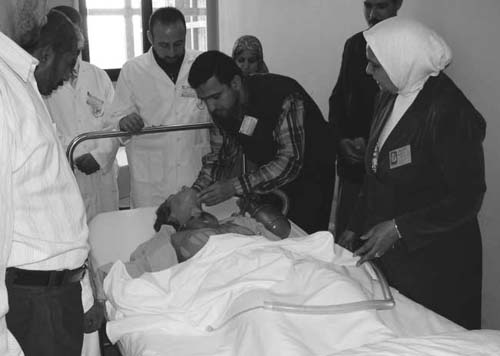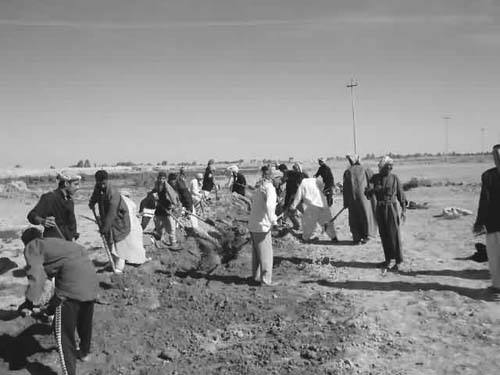Japan's Official Development Assistance White Paper 2006
Main Text > Part II ODA DISBURSEMENTS IN FISCAL YEAR 2005 > Chapter 2 Details about Japan's ODA > Section 2. Measures for Each of the Priority Issues > 4. Peacebuilding > (1) Iraq
(1) Iraq
It is essential that the international community, including Japan, continue the assistance for Iraqi nation building to realize a peaceful and stable Iraq. It is extremely important not only for the people of Iraq, but also for the peace and stability of the Middle East and the international community that Iraq rebuild itself as a peaceful democratic country with ensuring its sovereignty, unity, and territorial integrity. This is a matter of direct concern to the national interest of Japan, which relies on the Middle East for nearly 90% of its oil resources.
To date, Japan has conducted the reconstruction assistance of Iraq by combining the human contribution of Self-defense Forces (SDF) and ODA as the "two wheels of one cart." In July 2006, the Japanese Government decided to redeploy the Ground Self-defense Force (GSDF) troops that has been engaged in activities in Iraq; these have ended, but Japan will actively continue to provide assistance to Iraq.
To assist the country through ODA, Japan pledged at the Madrid Conference for Reconstruction of Iraq held in October 2003 to provide US$1.5 billion in grant aid for immediate needs, placing focus on rebuilding the foundations of the Iraqi people's livelihood in areas such as power generation, education, water and sanitation, health care, employment, as well as improvement of security. As for assistance for the medium-term reconstruction, Japan pledged to provide up to US$3.5 billion primarily through yen loans, focusing on infrastructure development in fields such as electricity and transportation. The US$1.5 billion in grant aid had been obligated by May 2005. Such assistance supports not only economic and social reconstruction but also the political process in Iraq.
A. Bilateral Assistance
Japan's direct assistance through grant aid to Iraq's government agencies has reached approximately US$900 million in total. Among the emergency grant aid decided upon in sequence to date, "Project for Provision of Police Vehicles," "Project for Provision of Mobile Substation," "Project for Provision of Fire Trucks," "Project for Provision of Armored Vehicles," and "Project for Provision of Equipment for Solid Waste Management" in Samawah were completed as of March 2006. Results of this assistance are beginning to be felt on the ground.
By October 2006, after consultations with the Iraqi side and various studies Japan also communicated its intention to the Iraqi Government to provide up to ¥100 billion (approximately US$860 million) in yen loans. This is the total amount needed for the implementation of "Port Sector Rehabilitation Project," "Irrigation Sector Loan," "Al-Mussaib Thermal Power Plant Rehabilitation Project," "Samawah Bridges and Roads Construction Project," "Basrah Refinery Upgrading Project" (Engineering services), and "Khor Al-Zubair Fertilizer Plant Rehabilitation Project."
Furthermore, in order to address Iraq's debt problems, an agreement was reached in 2004 at the Paris Club that 80% of Iraq's total Paris Club debt of US$38.9 billion be reduced over three stages. Based on this agreement a bilateral agreement was signed in November 2005 between Japan and Iraq, which would reduce Iraq's total debt owed to Japan of approximately US$7.6 billion (Japan is the number one creditor nation to Iraq) by 80% in total over the three stages. The debt reduction schedule works in tandem with International Monetary Fund (IMF) assistance programs, and as of September 2006, has progressed to the second phase.
 Capacity-development Assistance
Capacity-development AssistanceBased on the perspective that human resource development is important in advancing steady reconstruction efforts, Japan has been assisting capacity development of Iraqi administrative officials and engineers in various areas through training programs. From March 2004 to March 2006, approximately 1,300 Iraqis received training in Japan and in Iraq's neighboring countries such as Egypt and Jordan.
Under cooperation with Egypt, for example, assistance was provided for the reconstruction of the medical sector in Iraq, placing focus on personnel development for areas of high demand such as pediatric care, and the training of close to 500 Iraqi health care professionals took place over five sessions, in March and October 2004, March and July 2005, and in May 2006 at Cairo University and other medical institutions in Egypt. Third-country training was also held in Jordan to train nearly 500 (as of March 2006) relevant Iraqi personnel with the cooperation of related Jordanian institutions in areas of power generation, statistics, water resource management, water supply and sewage systems, museum and ruins management, and ICT education. In addition, Japan assisted Iraq's political process through trainings in Japan. Training was conducted twice, first in December 2004 and again in May 2005, for the Iraqi Independent Elections Commission. Also, a seminar on formulation of the Iraqi Constitution was held in June 2005 which was attended by a wide range of participants from each faction of the National Assembly of the Iraqi Transitional Government, including chairman al-Hasani.

A program of the third-country training in Egypt (Photo: JICA)
Chart II-21 Japan's Assistance to Iraq

 Assistance to the Governorate of Al-Muthanna
Assistance to the Governorate of Al-MuthannaIn the Governorate of Al-Muthanna, the central city of which is Samawah, the Government of Japan has provided assistance of more than US$200 million in total through ODA in the forms of grassroots human security grant aid and emergency grant aid in coordination with the activities of the SDF. In particular, the Government has placed priority on the following issues: provision of safe drinking water, stabilization of the electricity supply, provision of basic medical services, improvement of sanitary conditions, improvement of the educational environment, maintenance of community roads, creation of employment opportunities, restoration of public safety for people's lives and development of human resources.
In the electricity sector, the Government decided to provide emergency grant aid to the Project for Construction of Diesel Power Station in Samawah in May 2005. This project will enable the provision of enough electricity to meet approximately one-third of the total demand for electricity in the Governorate of Al-Muthanna (200MW). In the water supply sector, the implementation of grant aid for grassroots human security projects (the "Project for Improvement of Access to Safe Drinking Water in the Rural Areas of Al-Muthanna") is providing approximately 5 liters of safe drinking water per day per capita in the governorate. Moreover, in December 2005, in conjunction with the Cabinet Decision entitled Extension of the Basic Plan of the Special Measures Law for Humanitarian and Reconstruction Assistance in Iraq (made in an Extraordinary Cabinet Meeting), the Government of Japan decided to extend emergency grant aid of approximately US$14.4 million in total to the "Iraq Reconstruction and Employment Programme III (IREP III)," and the "Electricity Reinforcement Programme in AI-Muthanna Governorate." Both of these are being implemented by the United Nations Development Programme (UNDP) with a view to contributing to meeting the strong local demands for promotion of employment and improvement of the electricity supply. Some specific examples of cooperation with the SDF through ODA are that SDF medical officers provided instruction on the use of the medical equipment provided, and that the roads graveled by the SDF were paved with asphalt. Furthermore, yen loans are provided to help build a new bridge and reconstruct two bridges and to help rebuild irrigation facilities in Al-Muthanna Governorate.

A scene of the "Iraq Reconstruction Employment Programme (IREP) III" (Photo: UNDP)
Results produced through such assistances include ongoing rebuilding of basic life infrastructure of the residents of the governorate, signs of increasing liveliness within the City of Samawah, and expanding economic activities such as an increase in housing construction, and the commencement of cement factory operations.
B. Assistance through NGOs
Japan also provides assistance through NGOs in fields like medical care, education and water supply for humanitarian and reconstruction efforts in Iraq, the total of which is approximately US$27 million as of September 2006. Of this figure, close to 90% of the total assistance, which corresponds to around US$24 million, is reserved for projects for the reconstruction of Iraq, and was contributed to the Japan Platform (see page 173 for Japan Platform). Through this contribution three emergency reconstruction projects for internally displaced persons, returnees, and inhabitants in the northern part of Iraq, a project for the restoration of primary and secondary schools in Baghdad, and assistance for medical care in the northern region were implemented in FY2005 by NGOs under the Japan Platform.
Aside from this, Japan provides assistance to Japanese NGOs which are not under the Japan Platform as well as to international NGOs.41 Initiatives implemented through Japanese NGOs to date include provisions of medical equipment like incubators for newborns to Al Samawa Maternal Hospital and the provision of educational materials for the Samawah Nursing High-School. Moreover, Japan proactively provides assistance to humanitarian and reconstruction endeavors in Iraq through international NGOs. Examples of this include the provision of pharmaceuticals and medical supplies to Baghdad's Al-Kadhimiya Teaching Hospital and supplying water by renting water tank trucks to those residents in regions of the Governorate of Al-Muthanna not receiving water through water pipes.
C. Promotion of International Cooperation and Assistance through International Organizations
Based on the perspective that the promotion of international cooperation is important in the reconstruction assistance to Iraq, Japan extended US$490 million42 to the International Reconstruction Fund Facility for Iraq (hereinafter IRFFI), whose establishment was agreed upon at the aforementioned Madrid Conference. Through this contribution, Japan supports various reconstruction projects implemented by UN organizations and the World Bank (refer to the 2005 edition of Japan's Official Development Assistance White Paper for the actual performance of IRFFI). Besides contributing on the financial side, Japan also served as the chair of its Donor Committee for one year in 2004 as the largest contributor to the IRFFI.
Aside from its contributions to IRFFI, Japan also conducts assistance through international organizations on the order of US$100 million.
With the establishment of the Iraqi Transitional Government in April 2005, the Iraq International Conference was held in Brussels in June 2005 as a move to promote international harmonization. From Japan, the then Minister for Foreign Affairs Nobutaka Machimura attended the conference and co-chaired its Economic and Reconstruction Session. This conference was held to discuss political processes, economic issues and recovery, and public order and the rules of law. Following this conference, the Fourth Donors' Committee Meeting of IRFFI was held in Jordan in July 2005, with concrete discussions focused on the international efforts regarding reconstruction assistance. Japan will continue to put forth efforts in promoting international cooperation toward the reconstruction of Iraq.
D. Future Assistance
In Iraq, official government was inaugurated on May 20, 2006 as a result of the Iraqi National Assembly election held in December 2005. In light of this progress in the political process in Iraq and the transfer of responsibility on public security in the Governorate of Al-Muthanna province, the Japanese Government decided to redeploy the Ground Self-defense Force (GSDF) troops that had been engaged in humanitarian and reconstruction activities in Samawah, Iraq, judging that the objective of the GSDF's activities was now fulfilled. In addition, it is important that the international community lend assistance to the independent and autonomous efforts of the Iraqi Government for the future reconstruction process. Regarding Japan's assistance, all of the immediate assistance through the US$1.5 billion grant aid has been obligated. Hereafter, Japan will fully transit into a phase of providing assistance through yen loans. Moreover, bearing in mind close collaboration with its financial cooperation, Japan will also continue to provide assistance to capacity development through trainings. In this way, Japan will continue to actively support the Iraqi people's efforts to rebuild their country. In August 2006, Minister for Foreign Affairs Taro Aso visited Baghdad and held talks with Prime Minister Nuri al-Maliki and Minister of Foreign Affairs Hoshyar Mahmud Zebari of Iraq. In the talks he clearly conveyed the message that Japan's assistance to Iraq is on a solid footing, even after the redeployment of the GSDF.


 Next Page
Next Page